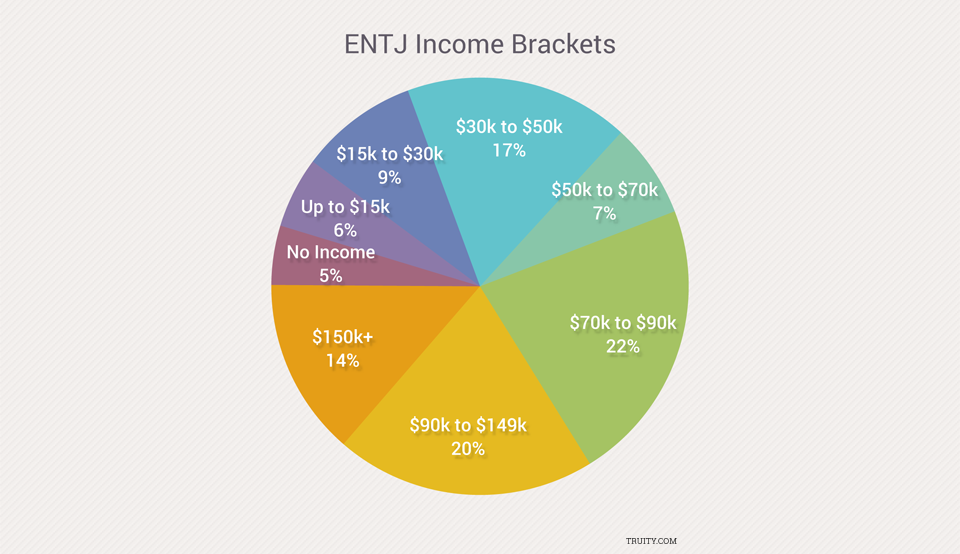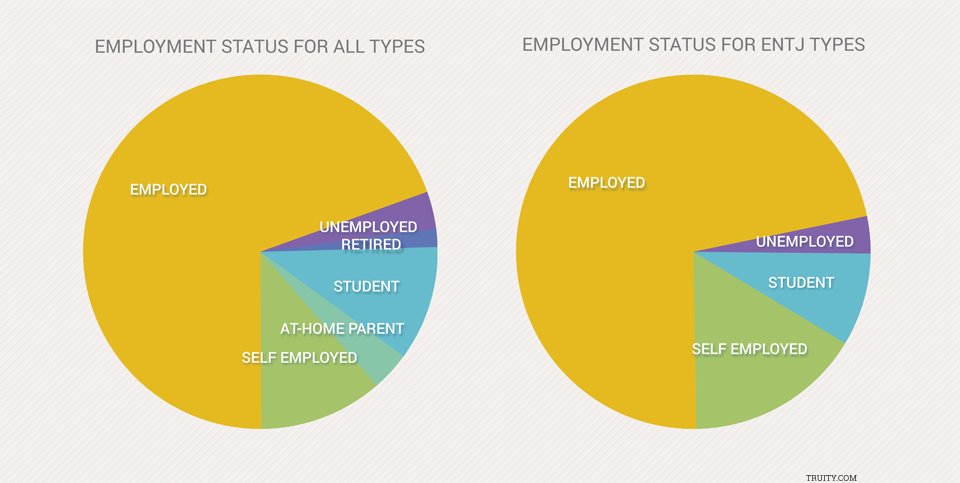
Why ENTJs Earn So Much More Money Than The Rest of Us
In a previous post, we noted that of all the personality types, ESTJs and ENTJs were, on average, the highest earners. In fact, these two types out-earn some of the other types by almost two to one. This finding has been duplicated by another survey which found ENTJ households had the highest income of all.

In our survey, ESTJs came out slightly ahead on our measure of average income, but when we looked closer at our volunteers’ income brackets the ENTJs excelled. The portion of ENTJs saying they made over $70,000 a year was a healthy 56%, compared to the ESTJs’ relatively paltry 44%.
So what’s the ENTJ's secret? What can we learn from these precociously prosperous personality types?
Let's take an in-depth look at the astonishing earning power of the ENTJ. Below, we see the breakdown of ENTJ incomes by bracket. For this analysis, we excluded ENTJs under the age of 21, to allow these nascent tycoons some time to develop their powers of economic domination.

A startling portion of the graph is made up of high salary ranges. Bear in mind, we asked volunteers to report only their individual income, not income earned by a spouse. So these numbers are all ENTJ.
So what are ENTJs doing that the rest of us aren’t? Let’s take a look at some of the other trends in their responses.

The first thing you may notice about this graph is that the Retired and Stay-at-Home Parent categories are completely missing from the ENTJ sample. Part of this may be due to the sample size: this analysis included 118 ENTJs over the age of 21 who chose to answer the question about employment status. That means that the expected number of ENTJs in these smaller categories would only be 2 or 3 at the most.
But even given a small sample size, it’s interesting that our group included no retirees or full-time parents at all. This finding suggests that perhaps one of the reasons ENTJs earn more is that they just don’t stop working: not to raise kids, and certainly not to accommodate tedious old Father Time.
We can also see from comparing the graphs above that ENTJs are somewhat more likely to be self-employed. This may account for some of the income advantage as well. While many a hapless couch potato has labeled himself “self-employed,” surveys show that people who are successful in owning their own businesses are much more likely to reach the upper limits of the income scale.
Assuming ENTJs are more likely to become entrepreneurs, as well as more likely to make their businesses work, their inclination to strike out on their own may account for some of their income advantage. Indeed, the self-employed ENTJs we surveyed reported an average income of just over $100,000 a year, compared to just under $80,000 for employed ENTJs.
This made us wonder: do all types get a comparable income benefit from working for themselves? Or are some types more likely to be high-earning entrepreneurs? Below is a graph showing the average income for people who reported being self-employed. For purposes of comparison, we’ve also noted the overall average income for each type. You may notice some personality types are missing; this is because we didn’t have enough self-employed ISFPs, ISTPs, ESFPs, ESTPs, ESFJs and ESTJs in our sample to draw a valid conclusion about their income.

We can see from this graph that, along with ENTJs, ISTJs and INTJs seem to enjoy a big income boost when they work for themselves. Most of the other types see a smaller boost from self-employment, while INFPs and ENFJs earn about the same. INTPs are the anomaly, with an average self-employment income that can only be described as meager.
One way to interpret this data is as a (very) rough measure of each type’s aptitude for self-employment. Going out on your own provides nearly limitless opportunities to profit from your own hard work and ingenuity, but it also provides limitless opportunities for abject failure. Perhaps some types are more apt to benefit from the risk, while others are better off with the structure of the 9-to-5. If this is the case, then ENTJs certainly seem up to the challenge of entrepreneurship.
Leadership seems to play a role in the ENTJ phenomenon as well. Our data show that ENTJs have a special inclination to take on managerial roles. This should be no surprise to anyone who knows an ENTJ: their friends and associates typically note that the ENTJ manages to commandeer a leadership role in pretty much every task presented to them, from sorting the laundry to picking a restaurant for lunch.

As you can see, ENTJs don’t have a lot of patience for roles where they can’t be in charge. While over half of the people in our sample as a whole weren’t in supervisory positions at all, the same was true for less than a third of ENTJs. When we narrowed the analysis to ENTJs over 30, who presumably have had more time to engineer a meteoric rise to the top, the numbers became even more pronounced.
There’s one more factor worth taking a look at. It seems, from our data, that ENTJs simply love to work. Their job satisfaction ratings are 9% higher than the average for all personality types. ENTJ business owners are particularly thrilled with their work.
It’s common career advice to “do what you love.” For ENTJs, it seems that perhaps what they love to do is work—and they’ve got the salaries to prove it.
Spread the Word!
Did you find this study interesting? We'd love if you'd spread the word by sharing the full infographic!












